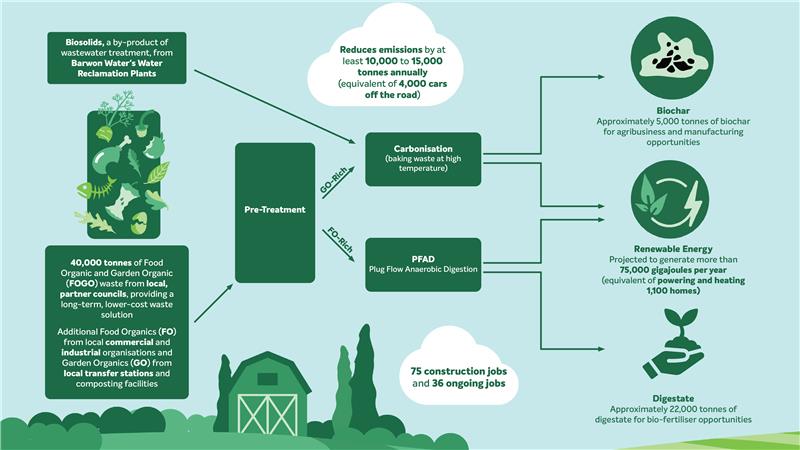A solution to our waste problem
Barwon Water is planning a world leading Regional Renewable Organics Network (RRON) facility at the Black Rock Water Reclamation Plant in Connewarre.

The planned facility will take household food and garden waste, local commercial and industrial organic waste and biosolids (organic materials from wastewater treatment) and safely convert it into products that enrich compost, soil and capture carbon for high value use in agribusiness and sustainable manufacturing, and at the same time produce renewable energy. In doing so, volumes of organic waste will be diverted away from landfill, reducing emissions and providing better environmental outcomes for the Barwon region.
We are partnering with local councils (Borough of Queenscliffe, City of Greater Geelong, Golden Plains Shire and Surf Coast Shire) along the way to align with the state-wide Circular Economy initiatives and Recycling Victoria Policy. The RRON will deliver significant environmental, economic and community benefits to the region.
Why is a Regional Renewable Organics Network needed?
Our region is growing and the waste we generate is too.
About a third of the waste that ends up in our household bin is food and most of this goes to landfill. This wastes a potential resource and generates greenhouse gases which can cause environmental and health issues.
This project provides an innovative solution to manage our increasing amount of waste. It leads the way in the transition to a circular economy, where materials are continually reused and recycled.
Transforming organic waste into a valuable resource
The RRON facility process works in two ways.
The food and garden organics (collected from your kerbside by your local council) will be processed primarily through the plug flow anaerobic digestion technology. This process will produce digestate - a compost like material - and biogas, that can be used for renewable energy.
Bulk green waste (such as branches and logs), and biosolids (a by-product of wastewater treatment) will be processed through the carbonisation process. This material will be 'baked at a very high temperature to create biochar - a carbon rich product and syngas.
The below image illustrates how the process works and some of the anticipated project benefits.

What is biochar?
Biochar, a carbon-rich, charcoal-like material that can be used in agriculture to improve soils for crops, while also locking away carbon for hundreds of years.
We’re partnering with Deakin and RMIT universities to research how biosolids from wastewater treatment, household food scraps, garden clippings, and industrial waste can be transformed into a remarkable product called biochar.
Biochar can be used as a replacement for fossil-derived carbon in battery production. Biochar has potential as the anode active material within sodium-ion batteries, a safer, cheaper battery technology.
The new research program is part of Deakin’s 'REACH' (Recycling and Clean Energy Commercialisation Hub) which fosters collaboration between industry, researchers and partner institutions to address environmental challenges and drive a sustainable future.
We’re also working with RMIT's new PYROCO equipment, which bakes organic waste into high-quality biochar, to improve biochar processing engineering and production.
What is digestate?
When the food and garden organics go through the plug flow anaerobic digester, it produces a product called digestate.
Digestate is a nutrient rich compost-like mixture that can be primarily used as a bio-fertiliser. It improves plant growth and soil quality, reducing the need for traditional fertilisers.
The raw digestate will be mechanically dewatered before going through an enclosed aeration process where air will be mechanically forced through the digestate. This process will reduce moisture in the product and significantly reduce odour, before the product is sent out for use.
The Environment Protection Authority (EPA) has only recently amended the classification of low risk digestate enabling the RRON digestate to be sold.
This key change provides an opportunity for the RRON facility to accept more waste that would otherwise go to landfill and produce a new product for soil and plant improvement.
Digestate is used in many other parts of the world as biofertiliser through direct application to land.
Where will the biochar and digestate be used?
There are many applications for biochar and digestate. For example, home gardeners, right through to farmers.
And with applications ranging from applying the biochar onto soil to using it in construction and manufacturing, many businesses are taking a keen interest in it.
We know there is a growing interest in substituting fossil fuel intensive products with more sustainable alternatives.
We will be spending the next two years further identifying end market uses for both biochar and digestate products.
Check out our FAQs, for more detailed information on the project
Get involved!
Since October 2021, we have been having community conversations about the Regional Renewable Organics Network.
We have been listening and learning to what the community are interested to learn more about, respond to questions, share information on how the facility will operate and share more information about biochar and digestate and how this can be used in the future. Read more about what the community has been saying in our community engagement reports in the Document Library.
At anytime you can ask a question or share your feedback by:
- Dropping a pin on the map (see tab below) and leaving a comment or photo
- If you would prefer to provide a longer response, please submit your document (see tab below)
- Use the Question tool to ask a question from the project team
- Contact us via the email or phone number below.
Read our FAQs to
learn more about how the project is responding to the questions and
ideas shared by the community.
Latest News
Contribute your feedback on the map
Submit a longer response
Submit a longer response
Ask a question
Ask a question
To ask a question you must create an account or log in.
These are the people that are listening and responding to your questions.
Respondent 1
Respondent 2
{{question.description}}






